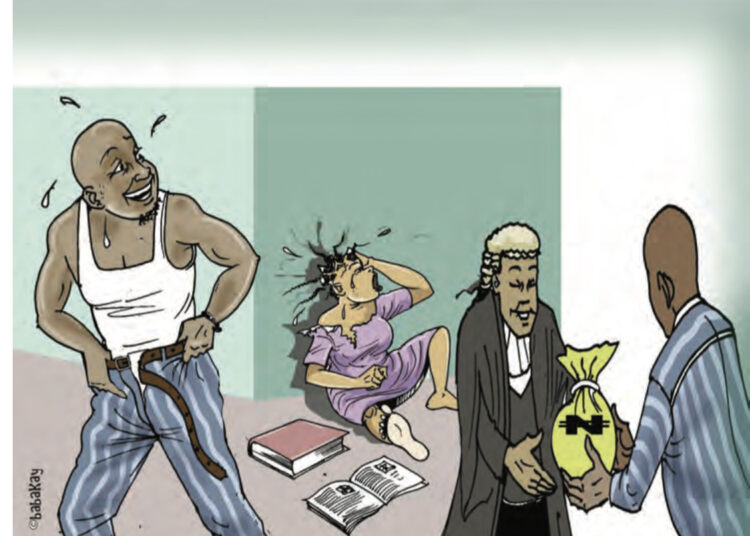It takes the supernatural to get justice for rape in Nigeria.
That could be the summary of The Origin: Madam Koi-koi, a two-part series on Netflix. It would not be a synopsis that does justice to the efforts of the story, but it is one that serves as the world marks 16 days of activism against Gender-Based Violence between November 25, (the International Day for the Elimination of Violence against Women) and December 10 (Human Rights Day).
Madam Koi-Koi (kos-kos in other places) is a legend of federal government colleges about a spirit that roams schools. Though it was never explicitly clear to me as a student of FGGC Bakori what would attract Madam’s ire or attention, generally there was a sense that breaking rules could result in exposure. The film, set sometime between the Seventies and Nineties is anchored on Amanda, a new student to a private religious school. The school is in a precarious situation with state officials who impliedly want to bring it under their control. There are a group of brilliant entitled boys running things including gang raping Ibukun, a fellow student, which has been covered up by the Mother Superior who is determined to see and hear no evil and there is Amanda terrorized by dreams of Madam Koi-Koi.
Mini spoiler Alert!
It turns out that decades before Amanda ended up at the school, Madam Koi-Koi herself was a victim of a violent gang rape and murder by a set of entitled young men in a town where she taught. Madam Koi-koi got no justice until she took matters into her own hand and started hunting the town. To appease her, the killers were not prosecuted and jailed, instead, they and all their future descendants, were banished from the town.
Millions are raped and sexually assaulted in Nigeria. According to a national survey on violence against children and UNICEF data, 1 in 4 Nigerian girls are sexually assaulted before the age of eighteen. Seventy percent of that number have experienced sexual violence multiple times. Other data from 2020 indicates that there were 11,200 reported rape cases in Nigeria and that only 5 percent of those sexually assaulted seek help. Around the Covid-19 pandemic, the common understanding within the development field was that the lock down exacerbated all forms of gender based violence, resulting in a shadow pandemic. However, in spite of increased awareness, international advocacy such as 16 Days of Activism which started in 1991, and resources dedicated to prevention, accountability and support around sexual gender-based violence (SGBV), justice is rare. Between 2019 and 2020, data from the National Agency for the Prohibition of Trafficking in Persons (NAPTIP), indicates that only 32 rape convictions were secured.
The low number of reports of SGBV are worrying but there are known challenges. The first is social stigma and the prevalent feeling that society views those who are raped and sexually abused, as somehow complicit. The blame is in what they wore (which is nonsense considering children as young as 4 and elderly women are raped) and/or where they were (people are raped in their homes – where else should they be?) and in their ‘reputation’ which is conjecture anyway, made up from assumptions. These factors combine to make reporting hostile – as we know from the #MeToo movement and some of the allegations made against men who are in the public e.g., Fatoyinbo and D’Banj.
Another complication with the social aspects of SGBV is when the perpetrator is known to the victim and is in a position of authority. This is where multiple incidents typically take place and when family and friends are most likely to get involved and apply pressure to keep the crime unreported. The case of Femi Olaleye, the doctor in Lagos who spent almost two years raping his wife’s niece is a rare one where he was reported by his wife when she found out. The common narrative about such scenarios is for wives to cover up the crimes of their husband. There would likely have been pressure on Olaleye’s wife to stand down and hopefully, one day she will share the full story with the public to encourage others.
More challenges to reporting rape
The second challenge is how badly the law, order and justice sector treats survivors. Survivors are often deliberately humiliated through police and lawyers questioning and interrogation, then comes years of court delays and eventually the denial of justice. Out of 155 rape allegations reported to police in Anambra state only 12 were investigated, and none resulted in a conviction. In Kano, of the 100 cases that made it to court in 2013, only 40 earned a conviction. In a thoughtful, well researched article, Nosmot Gbadamosi, in Why Nigeria is losing its fight to prosecute rape, points out that where convictions do happen, the courts ignore the laws and impose small fines and/or short jail terms.
Counterintuitively, the harsher the laws are, the less likely judges are to apply them. The Kaduna Violence Against Persons Prohibition law passed in 2018 recommends surgical castration for perpetrators, something a predominantly male judiciary in a rape permissive society would be hesitant to apply. This provision on castration is sensationalism and state sponsored barbarity at best. At worst, it means that perpetrators of rape have one more incentive to ensure there will be no reporting of the rape, which could increase the number of rape-murders. This was exactly the case with Madam Koi-Koi where the rapists where men she knew.
Third, the burden of proof by implication of a complicit society, lies with the survivor – another element of the Madam Koi-Koi film highlighted with Ibukun. In a country where the quality of public health care could be better and more responsive to social realities, getting medical rape examinations and evidence in a timely manner immediately after the rape is a problem. Any specimen taken will have to be preserved to ensure it meets the requirements of evidence admissibility, same as other things such as ripped and/or soiled cloths etc.
In the face of these challenges, it is difficult to fault those who choose not to report SGBV however, as long as cases are not reported, our data and knowledge of the true horrors and cost of SGBV will remain incomplete. The burden should be on societies to indicate through changed norms and actions that we are prepared to believe survivors and place the burden of responsibility where it lies: the state which has the duty to protect and remain impartial.
Looking forward
The myth of Madam Koi-Koi if truly ubiquitous across secondary schools in Nigeria could be an informal way of preparing young girls and boys to understand how damaging and life lasting sexual abuse is – for both survivors and perpetrators. It is a missed opportunity, that almost 40 years ago as I learned about Kos-Kos in Bakori, that seniors and teachers did not take the legend as an entry to engage with us about sex, consent and even defense i.e., how to navigate life and minimize contact with abusers. This is not a way of blaming survivors, as pointed out, women, children are raped in the safety of their houses, but it is for awareness and preparedness to make it harder for perpetrators inside and outside our lives to abuse us and those we love. Maybe schools can make the film part of their curriculum – it would be a great conversation starter and could do a lot long term to ensure that more Nigerians are invested in justice for SGBV.





